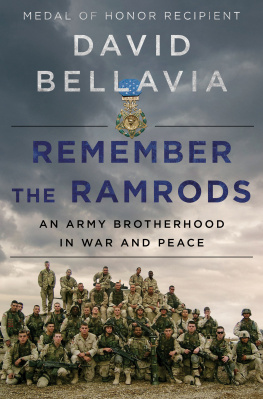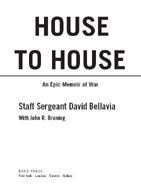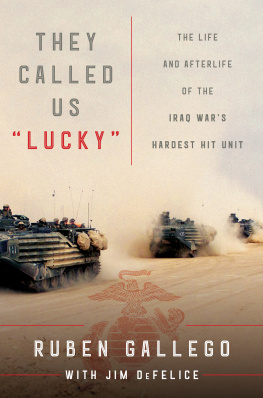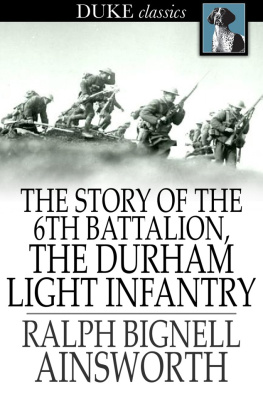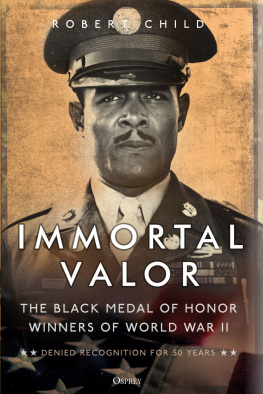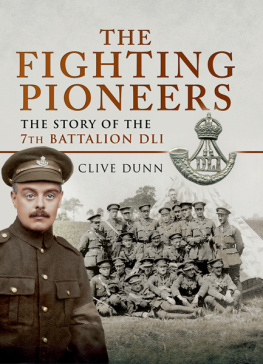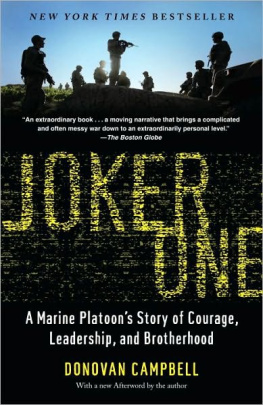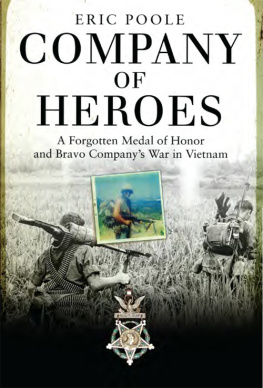Contents
Guide
To Marilyn B. Bellavia, the toughest of all the Bellavias
In memory of William D. Bellavia and James D. Hornfischer
Contents
I N 2005, I RETURNED from war wanting only to go back to it. Preserving the peace found in American civilian life was the entire reason why we fought the War on Terror, but after I came home from Iraq, that peace felt unearned. I was safe in New York again, trying to get a job, provide for my family, and raise kids all while the people I loved the most were still carrying the battle to our enemies.
In this world of normalcy, the people who should have been in that innermost circle of my lifemy children, my familywere almost strangers to me. Id been a continent or more away for the majority of my sons young life. I barely had time to experience fatherhood before I deployed overseas. I had a family of my own, but I didnt know them. Rectifying that became the defining feature of my life for many years.
My real family was still overseas, scattered to different units and areas of operations. Fighting for us. Out there, with them, lay the meaning and purpose that defined my self-identity. I was a warrior. A Soldier. I was a kid from New York who learned about loyalty and love in a way the vast majority of Americans never do: in the heat of combat. In those horrific moments I saw the full power of the human spirit. I saw the strength of connection, the selflessness born from love so profound that giving your life so another might live was not exceptional. It was the unconscious reaction to seeing your own people in danger.
There was none of that at home in a civilian world where the vast majority of military-age males were not in uniform, despite the fact the nation had been attacked on September 11, 2001. The normalcy was disorienting enoughI mean, at times I wondered if my fellow Americans even realized a war was being fought on their behalf. That disorientation grew to a full divide when I saw young men bagging my groceries at the local supermarket. Healthy guys, the same age as the Soldiers in my squad, stuffing kale and cucumbers into sacks while making happy small talk with customers.
It was about then I developed what most veterans do: a sense of superiority over civilians.
That kid had never seen a friend die in combat. His tattoos werent marred by bullet holes or shrapnel scars. Hed never tested the measure of himself or pushed others to do the same. Hed never bonded with men willing to die for him, and him for them. He had not sacrificed. He never willingly deprived himself of sleep or security, or of the arms of his beloved. Hed certainly never tried to keep warm by climbing into a body bag and spooning with his brothers-in-arms.
This was the conceit I brought into my civilian life. The Army tested me every day. It forced me to overcome challenges I thought insurmountable. I conquered them, but not alone. There is nothing more powerful than being respected by men you yourself hold in the highest regard. It fosters confidence and strength. It makes you strive to be better, always better. Those insurmountable challenges were overcome every time. Each one reshaped me a little bit more into the man I was when I returned home.
Civilians and warriors alike got it wrong. We combat veterans arent better than anyone: we just think we are. That kid bagging groceries? I assumed hed had a soft life, had never been in danger, and had never known privation. But those assumptions could have been way off the mark. Maybe he was working a third job to put himself through school. Maybe he quit school to take a shit job after his mother got sick. His sense of connection and loyalty to her trumped everything else in his life. Maybe he knew hunger, had lived on the streets as a child of homelessness, where constant danger was just a part of life. Who was I to assume he hadnt known sacrifice, hadnt shown devotion to someone or something he loved? Most of all, who was I to assume hed never even tried to serve in the military and had been medically disqualified or medically retired?
My own assumptions, I learned, cleaved the divide even wider. The conceit I felt? It didnt affect him; it only isolated me more and made life at home that much more disorienting. And lonely.
There was another factor to that gulf between protector and protected that I had not understood until I returned home and tucked my uniforms away in my fathers barn. The Army transformed me from boy to man by crushing adolescence. The boy is slayed through Basic Training. The man emerges on graduation day. Every branch of the military does this now with both men and women. The childishness within us, the immaturity to handle adversity, the dependence we had even in our teens on our parents and familyall that is destroyed and our warriors are rebuilt by the system to be capable, responsible, and dependable.
There is no similar process in civilian life. Our universities seem to breed perpetual adolescents.
Seventy-five years before, the Greatest Generation rallied together to defeat two of the greatestand most evilempires in history, the Third Reich and Imperial Japan. Fully a third of Americas military-age males spent the War on Terror fighting it on their Xboxes in Moms basement. No job. Not enrolled in classes. A generation living at home, letting Mom do their laundry as they played at clearing rooms with their cyber friends.
The first time I read those statistics, the divide between the warrior I was and the civilian world felt like a chasm. There was no redemptive arc in my own head on this one. There was no possible scenario, no backstory to match the ones for our grocery bagger that could ever justify in my head wasting the treasure of life on video games while not bothering to better yourself. I lived with tenacious ghosts riding my shoulder every day who reminded me of the enormous gift it was to be still breathing. I thought about them constantly, juxtaposing their lives against those squandering theirs here at home. It always made me angry. Unless we Americans accomplish with our time what they willingly gave up in theirs, the sacrifice of blood in Iraq and Afghanistan will have no meaning. I have tried to honor them by living for them, making something of value out of my existence here at home. I thought everyone felt that way. If you listen to Memorial Day speeches, we give lip service to that ideal. The reality? I kept returning to that statistic: one-third of a generation parked on Moms couch. That reality left me trending toward bitter.
My greatest regret has always been leaving the service I so dearly loved. I tried to make it work at home, but the pull of the battlefield was too strong. Out there, I had meaning and purpose. You live on a ragged edge of danger that forces you to confront your own mortality. Every breath becomes euphoric. You exist in a different emotional framework. In rural western New York, lifes color was drained away by a million little nicks. You stress over bills and taxes, a car thats become unreliable. The house needs siding, the floors in the kitchen need to be redone. All the logistical headaches of modern life take center stage and start to define your life.
Out there, on the battlefield, none of that shit matters. None of it. The complexities vanish, and everything boils down to this: can you measure up? When you do, you feel like a rock star. Nothingno drug in the worldcan compare to that moment of self-discovery. For me, self-discovery in combat convinced me the essence of life distills down to one thing: proving to yourself why you are needed in the fight.
I returned to combat in the summer of 2006 as a civilian war correspondent. I went again a few years later. I quickly discovered it was not the same. It wasnt the battlefield that gave me meaning, it was the men around me who did. Being there for them. I missed my tribe, not the combat I endured with them. That was the hole in my heart I felt open on the day I took off the uniform. It grew larger every year I was away from the Ramrods, the Soldiers I served with in Task Force 2-2 Infantry.

